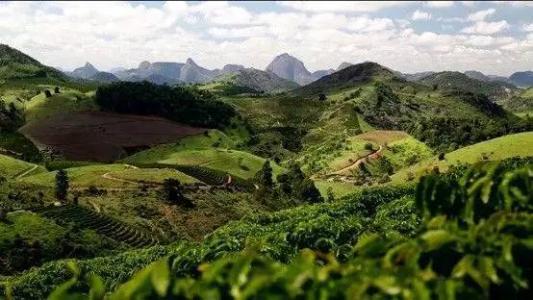The position of Chinese coffee in the world is becoming more and more important.
The domestic demand for coffee is increasing. In recent years, the world coffee giants continue to aim at the Chinese market, and Chinese local coffee brands have also begun to rise to produce coffee products such as instant powder, bottled coffee, freshly ground coffee and so on. However, domestic coffee is far from enough to meet the domestic market with huge consumption space in the future. China still needs to import a lot of coffee from abroad. Coffee import gradually increased from 13900 tons in 1998 to 59200 tons in 2015, with an average annual growth rate of about 13.7 percent. Coffee imports mainly come from Vietnam, Indonesia, the United States, Brazil, Colombia and Malaysia and other countries.
China's coffee consumption market is rising, and Mr. Huang Guangwen, the founder of Nankeng Coffee, has also targeted this market. Eight years ago, he entered Nankeng, Zhangzhou, Fujian Province, and reclaimed his own coffee farm to grow coffee there. Nankeng Coffee takes a different route from other domestic coffees. Nankeng Coffee wants to grow from the mainland to a can of coffee. Nankeng Coffee aims to grow and sell boutique manor coffee. Nankeng is located in the hinterland of a mountain forest in Zhangzhou, Fujian Province, the climate is similar to that of South America, the PH value of the soil is between 5 and 7, the sunshine is sufficient, and the air is slightly cold, which fully meets the needs of coffee growth. In order to find the best varieties, Mr. Huang Wenguang searched 12 countries and finally successfully introduced them from Dongshan Township, Taiwan, and set up a coffee farm in Nankeng. While Nankeng Coffee develops the local coffee market in China, it does not forget its original intention to spread and promote high-quality coffee to let the public know that it is in the culture of fine coffee. In the future, Nankeng Coffee will go international and endorse China's local coffee.
The development of coffee industrialization in China has mainly gone through four stages: from 1952 to 1978, for the consideration of national strategy, China began to grow coffee to supply the Soviet Union; from 1978 to 1988, some land reclamation systems began to try to grow coffee, and this stage experienced ups and downs. The third is 1988-2008, after Nestl é entered Pu'er in 1988, Chinese coffee gradually began to develop steadily, this stage is relatively long, after about 20 years. After 2008, in the past 30 years, coffee has changed from relying solely on agricultural initial processing, planting and export to the stage of not only agricultural exports but also industry and brands, constantly building and improving the industrial chain. This stage is full of opportunities and challenges. Coffee cultivation is also faced with the challenge of the transformation from traditional agriculture to modern agriculture, and it is also the stage of expanding international trade and tapping the potential domestic market.

Important Notice :
前街咖啡 FrontStreet Coffee has moved to new addredd:
FrontStreet Coffee Address: 315,Donghua East Road,GuangZhou
Tel:020 38364473
- Prev

There are 17 elements in the operation and management of coffee franchisees to achieve a virtuous circle of development.
(1) uniform beverage standards before opening a coffee franchise (ensuring the production process of each drink, ensuring that each drink has a specific cup.) (2) maintenance and maintenance of equipment and matters needing attention in use (such as smoothie machine, bean grinder.) 3 order flow (self-service order / service.) 4 service process (welcome words and farewell words for guests entering and leaving the shop. Fight with guests.
- Next

The price of Australian takeout coffee is rising three times faster than CPI.
The Coffee International Composite Index shows that the international price of coffee was $2.10 per pound in July 2011 and $1.59 per pound in July 2012, compared with a significant drop in the price of coffee beans. Despite the high takeout price, Australia is still expected to reach the per capita coffee consumption level of 2.95 kg in 2012, compared with 2.7 kg per person in 2009.
Related
- Can I make coffee a second time in an Italian hand-brewed mocha pot? Why can't coffee be brewed several times like tea leaves?
- Hand-brewed coffee flows with a knife and a tornado. How to brew it? What is the proportion of grinding water and water temperature divided into?
- What is the difference between Indonesian Sumatra Mantinin coffee and gold Mantinin? How to distinguish between real and fake golden Mantelin coffee?
- What does bypass mean in coffee? Why can hand-brewed coffee and water make it better?
- Unexpected! Ruixing Telunsu lattes use a smoothie machine to foam milk?!
- % Arabia's first store in Henan opens into the village?! Netizen: Thought it was P's
- Does an authentic standard mocha coffee recipe use chocolate sauce or powder? Mocha Latte/Dirty Coffee/Salty Mocha Coffee Recipe Share!
- What is the difference between Vietnam egg coffee and Norway egg coffee? Hand-brewed single product coffee filter paper filter cloth filter flat solution!
- What is the difference between sun-cured and honey-treated coffee? What are the differences in the flavor characteristics of sun-honey coffee?
- How to make Italian latte! How much milk does a standard latte use/what should the ratio of coffee to milk be?

